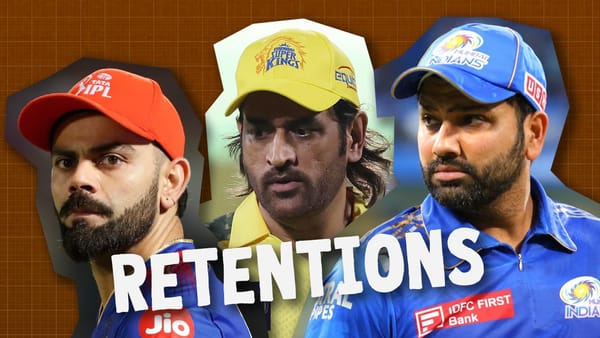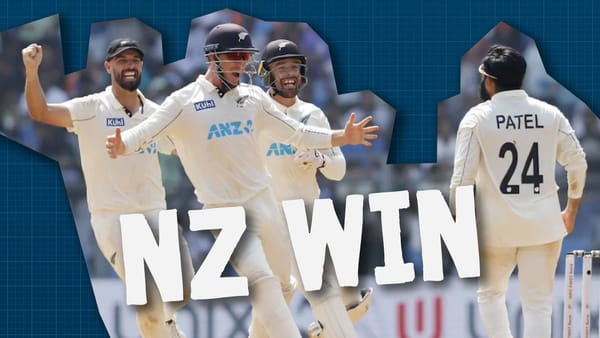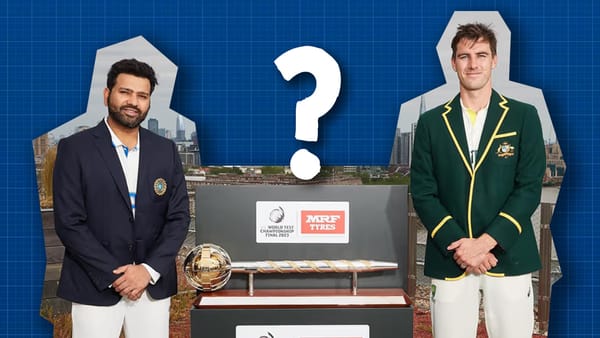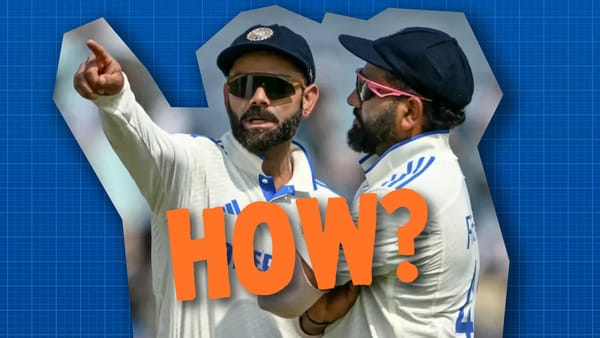The kids from the concrete nets get to number one
From Ilford Second XI to number one, an incredible rise for New Zealand.
John Reid prepared for a tour to England by facing a kid on a concrete net with a chewed up ball.

Anyone who has grown up with these kinds of wickets knows what they do. They savage the ball a chunk at a time, stripping the leather back like an act of cricket cruelty. Making that beautiful thing into a bloated soft mess. They don't swing, spin slow, the bounce is knee height and they open up at the seams. No international player - especially your team's all-round legend - should be warming up for a Test series against a kid on a concrete pitch with broken down balls.
New Zealand was a battle for resources like nowhere else in Test cricket. Other teams had either money or people, they had neither. And then they'd find someone like Reid, and they wouldn't be able to lift him up. Or, something else would intervene.
Perhaps the greatest story of New Zealand cricket is the partnership between Bob Blair and Bert Sutcliffe. It coincided with Blair's fiancé dying in what is still New Zealand's most devastating train tragedy.
New Double Century - The Broken men partnership
— Jarrod Kimber (@ajarrodkimber) 8:15 AM ∙ Jul 10, 2020
Burt Sutcliffe, Bob Blair and the Tangiwai train disaster
Probably my favourite episode in season one. (You may need tissues).
That is real life crashing into cricket. But from an on-field perspective, what happened to Sutcliffe that day probably had a longer-lasting effect. He was struck in the head by Neil Adcock, and was never the same batsman again. He was still quality, but he should have been great.
Things like this kept happening to them. After decades of struggling to find opening batsmen, they discovered Glenn Turner, who helped them win their first series against Pakistan.
So in 1969 when they won their first series it was against Pakistan in Bangladesh (East Pakistan back then). It could not have been a more remote place to have your first win, and this is what New Zealand administrator Don Neely said of it:
— Jarrod Kimber (@ajarrodkimber) 10:41 AM ∙ Jan 6, 2021
"It's a pity this side hasn't had greater recognition -- perhaps their achievements were overshadowed by other world events in those tumultuous times, which saw men walking on the moon, as well as Vietnam and Woodstock." Still my favourite cricket quote.
— Jarrod Kimber (@ajarrodkimber) 10:42 AM ∙ Jan 6, 2021
Turner was a fierce professional playing for a happily amateur nation, and it would never last. So in a 14 year Test career, he played only 41 Tests. If Turner was abrupt and demeaning, it's because he knew what it took to be one of the best in the world. And his team did not. In 1977 that meant there was a clash.
Turner resigned from the New Zealand captaincy that year. He was 30, clearly in his prime as a batsman, and he dominated County Cricket. And this wasn't even the only time they lost an incredible opener to England. When New Zealand started Test cricket, Stewie Dempster had been playing first class cricket for nearly a decade. He took New Zealand's first ball in Tests, and in three years averaged 65 over 10 Tests. They were his only matches. Sir Julien Cahn, an eccentric millionaire who hired outstanding cricketers for his own personal cricket team - that he played in - recruited him. Dempster would move to England, and when not playing for Cahn, he would have an incredible career for Leicestershire.
Their three best batting prospects never produced what they needed. And it's part of the reason they got stuck.
Australia played their first Test against New Zealand in 1946, they did not consider it a Test at the time. New Zealand made 42 and 54, Australia did not play New Zealand again for 10,136 days. In 1955, New Zealand went into the third innings 46 runs behind England. England won the match by an innings and 20 runs. Their greatest series for years was the time they went to England and drew every Test. Even after 1969 and their win over Pakistan, it would take another decade to win again. Nothing came easy.
Yet when they won again, it was only against the West Indies. Sure, it was umpire assisted, but that wasn't so rare back then, and it was still the best team in the world, possibly ever.
The West Indies are important because something exciting happened in the 1980s after generations of being a game dominated by England and Australia, three of the other teams took over. The West Indies were what everyone wanted to talk about, and whatever was left went to Pakistan. That New Zealand were the third-best team in cricket - and should have capped it off with at least a World Cup final - was harder to notice.
When they played great cricket under Stephen Fleming, they won the Champions Trophy (for whatever that is worth) and were a really good cricket team. But Australia were around and sucking the oxygen out of the conversation.
When they were good in the 1980s, they still weren't given the credit they deserved. They unearthed the most incredible wicket-taking machine. Instead of being lauded for it, they were mocked. Graham Gooch said facing them was "like the World XI at one end, and Ilford Second XI at the other".
If anything, they were given credit not for being good, but for being innovative. Henry Rollins once said that James Brown couldn't have come from France, he had to come out of the US. Could Jeremy Coney really come from anywhere else than New Zealand? And not just him, Martin Crowe, Stephen Fleming, Brendon McCullum and Kane Williamson too. I just don't know how another cricket culture would have come up with this group. Even Neil Wagner, he might be South African by birth, but would SA have let his freak flag fly like this?
But if you don't get to the top, you are a novelty, where New Zealand remained. Loved, patted on the head, ignored, a cricket career remaining friendly and non-threatening. The cutest Test nation permanently in the friend zone. The second favourite team, the second-best, and the Ilford second XI.
Now they have achieved this the reply guys are lining up to point out this doesn't count. One reason you will see is they have played little away from home—eight Tests in the last four years, which is shockingly low. Yet, they've played five in the last two years, the same as Australia, West Indies, Bangladesh and two more than South Africa. And it's the last two years is where most of the points come from. They should have played more cricket away, but they aren't the first team to get a run good in the rankings.
People will also turn to the other thing that they still haven't beaten Australia, and they seem stuck in their near-pathological fear of their perpetual big brother.
And the final one is that they aren't like a universal champion. Let's call this a hangover from when Australia and the West Indies were so dominant that a ranking wasn't needed. We now think that the ICC ranking seems to swap every time someone in Dubai sneezes. In 2016 five teams were number one. But even if this is just a quirk of the system with some home wins and no victory over the Australians. They're not accidentally number one, this isn't a participation award. They have gone up against the three biggest teams in cricket and stole their gold.
This isn't just a victory for Kane Williamson and his team. Though obviously, they get much of the credit. It took a nation over many generations to continue to stand up and grow. So many players who just weren't good enough, or prepared correctly, to go forward. This is a win for an incredible cricket culture that kept fighting for the sport they loved. Eleven people didn't do this alone. This was a victory for all of New Zealand cricket, from those who forwarded the game, just an inch at a time. All those kids forced to play on concrete wickets.
We tend to think of teams like New Zealand the way they have been when we first paid attention. And for most of us, they've been a major part of cricket. But they had to battle for that. They were ignored by Australia, Relegated to second class status by England. And Ram Guha wrote that India patronised New Zealand, even while India were struggling. They were the worst of Bangladesh for 50 years. And even when they got better, they were seen as at best benign.
This isn't just another team winning the defective ICC algorithm. For 48 years, this team won a single series. And that team has now achieved something their early legends couldn't even dream of. John Reid would talk about lying to his teammates about their chance of winning. Bert Sutcliffe never played in a winning NZ side. Walter Hadlee had to lead a team that couldn't make 100 runs in a Test. And the culture they helped grow did something they couldn't have even dreamt of.
Think of all those New Zealand innings you've seen where one player has fought through. Against better bowlers, with a pitch not helping them, using their own method, sticking to the crease any way they can. Through lunch, tea, and beyond stumps. Making a hundred against all the odds. That is what New Zealand cricket has done for 90 years.
They have battled through their history, and now New Zealand has gone from Ilford second Xi and concrete nets to number one. This is for the early heroes like John Reid, but maybe more for all those kids in the concrete nets.
Guested on the latest Red Inker with @ajarrodkimber to look back on cricket in 2020. Somehow, Heather Graham came up.
— Vithushan Ehantharajah (@Vitu_E) 11:20 AM ∙ Jan 6, 2021
Available for your ears here:




